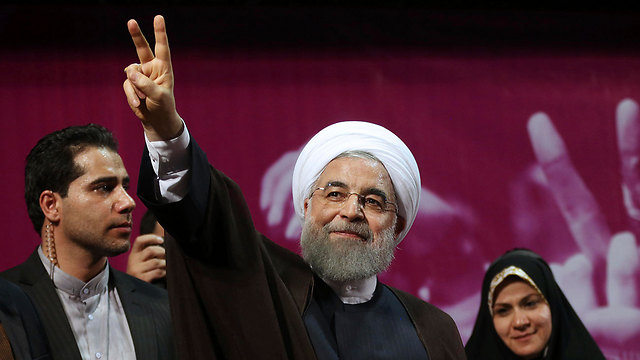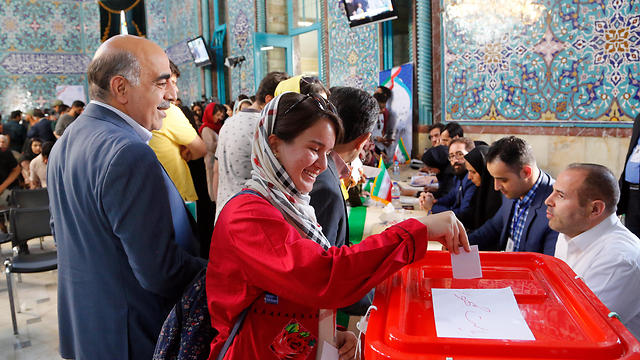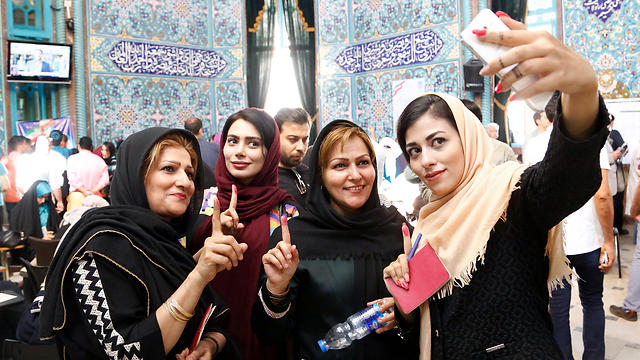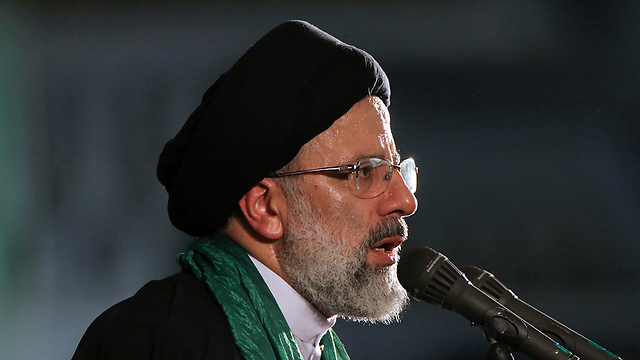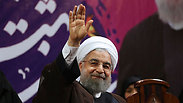
Iran incumbent Pres. Rouhani holds 7 million vote lead
Iraninan President Hassan Rouhani, a moderate, is set to win by large margin, in vote mainly serving as referendum on his outreach to the West, which culminated in 2015 nuclear deal; Iran's president is subordinate to country's Supreme Leader Ali Khamenei, who remains deeply suspicious of US and its intentions toward Iran.
Iran's incumbent President Hassan Rouhani had a commanding 59 percent lead over his rivals in an initial and partial count of votes in the election, according to official figures announced Saturday morning.
The Iranian Interior Ministry announced Saturday that after counting 38.9 million votes in Iran's presidential election yesterday, incumbent President Hassan Rowhani leads a considerable gap. According to the data, 22,796 million voters voted for Rouhani, while his rival Ibrahim Raisi won 15,452 votes.
According to reports from Iran, voter turnout in the elections was high, to about 70%. Of 56.4 million eligible voters, more than 40 million voted.
Correspondents reported that the lines they found in Tehran were in many cases longer than those observed in the 2013 presidential election, when Rouhani was elected. Commentators estimated that a high voter turnout would increase Rouhani's chances of winning. If one candidate receives more than 50% he will be declared the winner. If no one gets more than 50%, the two candidates who reach the top two will face a second round against each other next week.
The strong margin for Rouhani will, if it holds, be enough to give him an outright victory and avoid a two-person runoff next Friday. In 2013, Rouhani won the presidential election with nearly 51 percent of the vote. Turnout for that vote was 73 percent.
Election officials repeatedly extended voting hours until midnight to accommodate long lines of voters, some of whom said they waited hours to cast their ballots.
Rouhani, a moderate, is seeking re-election in a vote that will largely serve as a referendum on his outreach to the West, which culminated in the 2015 nuclear deal Iran struck with world powers. Under the accord, Iran agreed to limit its enrichment of uranium in exchange for the lifting of some economic sanctions.
Despite the nuclear deal, Ali Khamenei—who as will remain Iran's top decision-maker—remains deeply suspicious of the United States and its intentions toward Iran.
The 68-year-old Rouhani has come to embody more liberal and reform-minded Iranians' hopes for greater political freedom at home and better relations with the outside world.
Preliminary vote tallies have him ahead with 22.8 million votes, out of 38.9 million counted so far.
His nearest challenger is hard-line cleric Ebrahim Raisi, with 15.5 million votes. Khamenei is believed to favor the hard-line Raisi, who has support from major clerical bodies, hard-liners in the establishment as well as close allies of former hard-line President Mahmoud Ahmadinejad.
The two other candidates left in the race, Mostafa Mirsalim, a former culture minister, and Mostafa Hashemitaba, a pro-reform figure who previously ran for president in 2001, respectively have 455,000 and 210,000 votes each.
Hashemitaba was among the first to predict an outright win for Rouhani as he offered his congratulations Saturday morning.
"Rouhani will apply his ever-increasing efforts for the dignity of Iran" in his next term, the reformist said.
Although considered a moderate by Iranian standards, Rouhani was nonetheless the favorite pick for those seeking more liberal reforms in the conservative Islamic Republic.
He appeared to embrace a more reform-minded role during the campaign as he openly criticized hard-liners and Iran's powerful Revolutionary Guard, a paramilitary force involved in the war in Syria and the fight against Islamic State militants in neighboring Iraq.
That gave hope to his supporters, who during recent campaign rallies called for the release of two reformist leaders of the 2009 Green Movement who remain under house arrest. The two figures, Mir Hossein Mousavi and Mahdi Karroubi, both endorsed Raisi, as did Mohammad Khatami, another reformist who served as Iran's president from 1997 to 2005.
Iran has no credible political polling to serve as harder metrics for the street buzz around candidates, who need more than 50 percent of the vote to seal victory and avoid a runoff. But what scant data that was available before the vote showed Rouhani in the lead.
Iran's president is the second-most powerful figure within Iran's political system. He is subordinate to the country's supreme leader—Khamenei—who is chosen by a clerical panel and has the ultimate say over all matters of state.
It is still a powerful post. The president oversees a vast state bureaucracy employing more than 2 million people, is charged with naming Cabinet members and other officials to key posts, and plays a significant role in shaping both domestic and foreign policy.
All candidates for elected office must be vetted, a process that excludes anyone calling for radical change, along with most reformists. No woman has ever been approved to run for president.
Ahmadi said the Interior Ministry expects to announce final results later Saturday.










